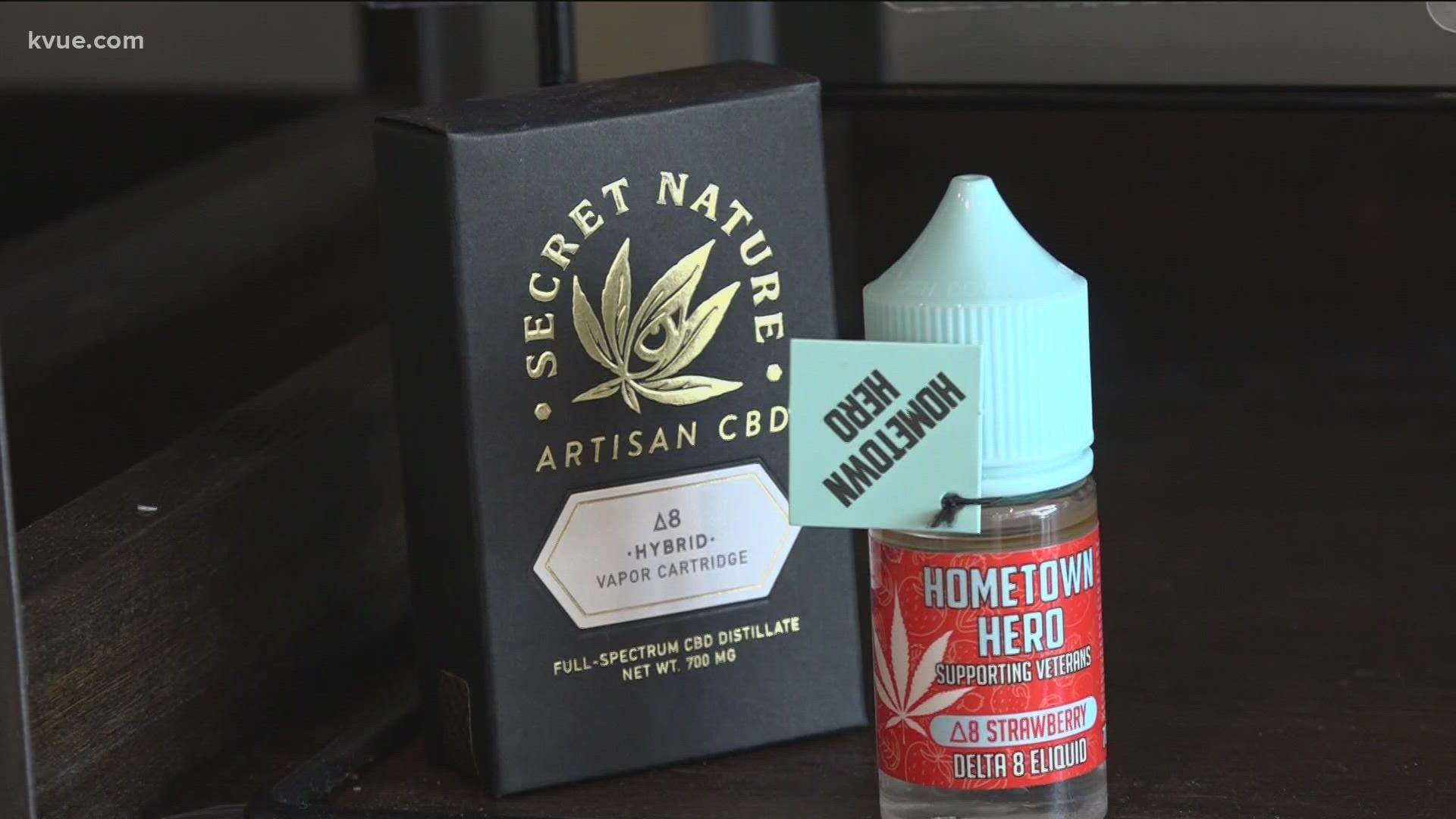AUSTIN, Texas — After an update to the Texas Department of State Health Services Consumable Hemp Program webpage on Friday for clarification, delta-8 tetrahydrocannabinol (THC) products in any concentration are still considered an illegal Schedule 1 controlled substance.
The update comes after House Bill 1325, which was passed in 2019, established Texas Health and Safety Code Chapter 443. It allows for the commerce of consumable hemp products across the state that do not exceed 0.3% delta-9 THC.
The clarification states that all other forms of THC, including delta-8 in any concentration and delta-9 exceeding 0.3%, are considered Schedule I.
The owner of Capital CBD American Shaman said it came as a surprise to him. Now he is worried because delta-8 makes up a decent portion of his income.
"It has become a significant portion of revenue," said Michael Sterling. "I'd say it's upwards of, you know, 30%, 35%, so it's quite a big deal."
The founder of CBD American Shaman said the company is thinking about suing.
"There's some other people in the industry that are working on things," said Vince Sanders. "So we're kind of standing back to see what they file or what that looks like. We'd rather kind of measure twice and cut once."
Hemp lawyer Lisa Pittman predicts delta-8 will stay illegal in the state for a while.
"We'll just have to see how that goes, but I don't expect delta-8 to be around for a while," said Pittman. "Delta-8 derived from marijuana has already long been on the Schedule 1 of the DOJ controlled substances."
The U.S. Food and Drug Administration (FDA) states that delta-8 is one of more than 100 cannabinoid produced naturally by the cannabis plant in lesser amounts. As a result, delta-8 THC can be manufactured from hemp-derived cannabidiol (CBD).
According to Discover Magazine, delta-9 THC is found in more abundance in cannabis and is often considered more potent. Both delta-8 and delta-9 products are often found sold as grindable "flower," edibles or via smokable vape products.
"It is important for consumers to be aware that delta-8 THC products have not been evaluated or approved by the FDA for safe use in any context," the FDA website states. "They may be marketed in ways that put the public health at risk and should especially be kept out of reach of children and pets."
The FDA reports that delta-8 THC does have psychoactive and intoxicating effects similar to delta-9 THC. The FDA has also received numerous adverse event reports from delta-8 THC consumers, including hospital admissions, hallucinations, trouble standing and loss of consciousness.
Sanders said the clarification will be a disservice to those who use the products properly.
"The majority of the people we see are baby boomer females," said Sanders. "We see 60-year-old women who have stress and anxiety, who have hip pain or the other pre- or postmenopausal or having other issues. This helps tremendously with all of the sites."
The DSHS said there has not be a recent change to the law or rules, but the clarification was posted in response to recent requests from hemp growers who said that there was confusion in the industry about what was allowed in consumable hemp products.
An outright ban on delta-8 and other THC products in Texas, House Bill 2593, failed to pass during the 87th Legislature this year after the provision was stricken from the legislation.
Another bill that would have outlawed delta-8 THC, HB 3948, also died in the Legislature after an agreement could not be reached on amendments between the Texas House and Senate versions.
During committee testimony on that bill in May, the Texas DSHS said it believed "delta-8 remains on the Schedule 1 drug schedule in Texas," raising questions if it was already illegal in the state.
The testimony was in response to an August 2020 federal DEA ruling adding language excluding THC compounds that fall under the definition of hemp from the list of controlled substances.
Delta-8 products have been available for purchase in many shops across the state. The DSHS can take enforcement action against hemp licensees who sell consumable hemp products containing controlled substances, however, the DSHS does not regulate possession.
The Texas Department of Public Safety told KVUE it will continue to base its enforcement efforts on current statute.
PEOPLE ARE ALSO READING:

